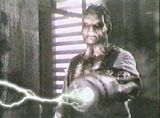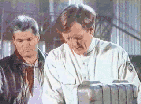

A reporter from Interstellar Network News has arrived on Babylon 5, to cover the second anniversary of the opening of Babylon 5 (an event which was extremely unlikely, considering the fate of the previous Babylon stations, according to the reporter). Unfortunately for her, Sinclair is on a mission to check out a damaged transport and is therefore unavailable for an interview.
At the medical lab, Dr. Franklin is greeted by an old professor of his, Dr. Vance Hendricks. Hendricks offers Franklin an "adventure, very possibly the biggest adventure you've ever had." Hendricks, however, does not explain anything to Franklin yet--he explains that Franklin will find out in due time.
At the customs center on B5, material entering the station is checked for security reasons--any organic matter or other, possibly dangerous substances must be quarantined. At this particular time, a seemingly uneventful search is being carried out. However, the attendant carrying out the search notices a possible security violation in the cargo of a certain individual, Nelson Drake--it appears that one of his suitcases is arranged so as to hide something. "If I didn't know any better, I might think you were trying to smuggle something in," comments the attendant on duty. Nelson waits for the appropriate moment, then kills the attendant-- and brings his contraband material aboard the station.
 Inspecting the cargo.
Inspecting the cargo.
Dr. Franklin is called to examine the attendant that was killed. He finds that the attendant was almost certainly died of natural causes--a heart attack. However, at the insistence of Garibaldi and Sinclair (who has arrived back at the station), Franklin agrees to perform a thorough autopsy.
Franklin returns to the medical lab in order to meet with Dr. Hendricks to find out what this "adventure" was that Hendricks spoke about. Hendricks explains that he needs Franklin's help to study some artifacts found at a recent dig on an alien planet. First, he introduces Franklin to his assistant--none other than Nelson Drake. Nelson opens the container that holds the artifacts--
--and a sudden energy spike is detected on the bridge.
Meanwhile, at the medical lab, Hendricks explains that he was on a dig at Ikarra VII, sponsored by a corporation known as "Interplanetary Expeditions." He found some thousand-year-old Ikarran artifacts sealed deeply in a vault. He asks Franklin to run these artifacts through his medical scanners. Franklin complies and (as Hendricks apparently expected) finds that the artifacts are composed of living tissue--they are an example of organic technology--"the one trick that Earth hasn't been able to crack," according to Hendricks. Franklin is amazed, but suddenly asks Hendricks why he wasn't informed of these artifacts as soon as Hendricks arrived on the station--since organic material must be quarantined before it is allowed on the station. Hendricks simply replies that the quarantine was undergone at their previous location. When Franklin comments that there are surely better facilities back on Earth, Hendricks only insists that he needs someone he can trust. Hendricks entices Franklin, saying that Franklin will achieve his dream of "going down in the history books" if he goes along with Hendricks. Franklin, at length, agrees.
Later, Nelson is in his quarters when one of the artifacts seems to come alive. It releases a powerful energy surge toward Nelson, which propels him across the room. This energy surge apparently has had some physiological effect on Nelson, who notices (a short time after) that his skin is undergoing some type of metamorphosis.
On the bridge, Sinclair is questioning Garibaldi about the dead customs attendant--he wonders if the autopsy has shown anything yet. The death, according to Garibaldi, still seems to have been a natural one--nothing abnormal has been found yet, although the autopsy is not yet complete. Ivanova reports that some unusual energy readings have been detected--she is presently investigating them. Further, she reminds Sinclair of his interview with the ISN reporter. Sinclair acknowledges this, but it is clear the is not looking forward to it. Garibaldi asks him why he is so adverse to this interview; Sinclair replies that the last time he was called for an interview (in which he was instructed to "relax and say what I really felt"), he was shortly transferred to a far-away outpost as a result.
Franklin and Hendricks have meanwhile, for the last fifteen hours, been studying the organic artifacts. Franklin suddenly asks Hendricks what will happen when and if they finally figure out how the organic technology works. Hendricks replies that they will sell it to an Earth corporation, but Franklin expresses a certain resentment at this--Franklin says how he always thought Hendricks was the kind of man who made his own discoveries, rather than stole them from old alien civilizations. "Granted, this may be important," says Franklin, "but ... it's a shortcut.... Feels a little like grave-robbing." Hendricks replies that the only way to really explore the galaxy is through corporation grants--he explains the wondrous things he's seen on corporation-financed missions. Franklin then confronts Hendricks with the fact that he cannot find any information on the corporation that supposedly financed the expedition on which these artifacts were discovered. Hendricks avoids the question and promises to explain everything the following day.
Garibaldi is meeting with the reporter, trying to explain to her about his background with Sinclair and B5. She interrupts him, and confronts him with that background: "I've come across several rumors surrounding your record prior to Babylon 5," she says. "That you were fired five times for unspecified personal problems and that this is your last chance to make good." Garibaldi vehemently denies comment.
The organic artifacts, in Nelson's quarters, are strengthening their hold over Nelson. He is falling more and more under their control.
When Dr. Franklin next enters the medical lab, he is surprised to find Nelson standing there. Nelson has undergone some strange metamorphosis; he shoots Franklin, saying only one word: "Protect."
Later, Garibaldi is informing Sinclair about the incident that just happened to Franklin. They both go to visit Franklin in the infirmary. Franklin explains to them that the weapon Nelson used to shoot him had a similar design to the organic artifacts. Garibaldi is surprised to hear that the artifacts are organic; he asks Franklin if they were checked at customs. Franklin can only reply that Hendricks told him that they were checked--he can't offer any guarantee.
Nelson is meanwhile walking around some obscure level of B5. He has undergone an extreme metamorphosis; he is no longer recognizable as Nelson.
Sinclair goes to confront Dr. Hendricks. Sinclair tells him that, according to Franklin, the armor that Nelson was wearing was very similar to the organic artifacts that Hendricks brought aboard. Garibaldi adds that the artifacts were brought on to the station illegally--somehow, they were not put through the required quarantine, either on B5 or at Hendricks's previous location. Hendricks says that he knows as little as Sinclair and Garibaldi know--he says that Nelson told him that they were, indeed, quarantined. However, Sinclair explains that, whether or not Nelson was under Hendricks's orders, Hendricks will be held personally responsible for the incident. Hendricks, when asked, says that the organic artifacts have limited energy and might attach themselves to another organism to achieve mobility; he cannot, however, explain why they may have attached themselves to Nelson but to no one else who has been exposed to them. He guesses that the artifacts are now controlling Nelson; he cannot, however, explain =why= the artifacts might take him over. He says that he will need to study the artifacts further in order to figure out their purpose and methods. Sinclair allows him to assist Franklin in further research.
Nelson, under the control of the artifacts, shoots and kills a group of people who walk by him (on the obscure level where he was walking before). Again, he says, "Protect!"
 "Protect!"
"Protect!"
Simultaneously, on the bridge, another energy surge is detected. They pinpoint the location of the surge and determine that it is 20% more powerful than the previous surge.
Garibaldi reports that there are two deaths on the level known as "Grey-13." Garibaldi leads a security team to that area. Sinclair calls a "Level 2 Alert." Just then, the reporter from ISN enters the bridge, claiming to be interested in whatever problem is occurring--"the people have a right to know"; Sinclair orders her to leave.
Garibaldi's security team has found Nelson. The team fires at Nelson, but Nelson is unharmed. Nelson continues toward the place that he was originally heading.
Franklin, while studying the artifacts with Hendricks, discovers a certain device in Nelson's belongings. He hides the device from Hendricks's view. Meanwhile, the study of the artifacts continues.
Sinclair, meanwhile, guesses that Nelson is heading toward the Central Corridor, the area with the greatest population and, consequently, the area where Nelson can do the most damage. Ivanova reports that, although Nelson must rest after every time he attacks, his periods of rest are becoming shorter--and his power is increasing each time. Sinclair realizes that their next chance to stop Nelson may be their last chance.
Franklin has finally accesses the memory banks of the artifacts; he reports to Sinclair what he has found: In the course of Ikarran history, the Ikarrans were invaded many times. Because of these repeated attacks, they created organic weapons to use against their enemies. Because it would take too long to create an artificially-intelligent weapon, they incorporated the personality matrix and brain patterns of one of their researchers, known as Tumar. Because of the possibility, however, that their enemies might "fool" the weapons (for the weapons have personalities), the Ikarrans programmed their weapons not to accept commands from anyone but "pure Ikarrans." However, as Franklin points out (with a bit of disgust), there is no clear way to define a "pure" Ikarran--"no one is pure," he says. Franklin continues to explain that a coalition of religious fanatics and military extremists defined what it meant to be a "pure" Ikarran-- their standards were based on ideology rather than science. (Sinclair points out the similarities to Hitler's "perfect Aryan" idea in WWII). Unfortunately for everyone involved, after the weapons killed the enemies of the Ikarrans, they turned on the Ikarrans themselves, killing anyone who didn't =perfectly= match the standards of what a "pure Ikarran" was. They kept killing everyone until the last Ikarran was dead. Then, through centuries of disuse and neglect, the weapons failed. However, the artifacts that Hendricks discovered contained one of these weapons--and it has activated itself by attaching itself onto Nelson. Sinclair has an idea how to stop it: if the weapon has a personality, he will try to contact that personality and reason with it, thereby attempting to bypass the programming.
First, however, Garibaldi and Sinclair set up an extremely powerful attack against Nelson. The attack fails completely; it doesn't even slow Nelson down.
 Nelson under attack.
Nelson under attack.
Sinclair, therefore, feels he has no other choice but to try to speak with the personality--with Tumar. "I'm going to try to make it mad," says Sinclair; he explains that, by speaking with the personality of the weapon, he will try to lure Nelson to the docking area, which they can detach and eject--"armored or not, nothing can live in a vacuum." Garibaldi objects, but Sinclair goes anyway.
Sinclair speaks to the weapon. He attempts to anger it by saying (truthfully) that the Ikarran race is dead. Sinclair's plan works--Nelson follows him to the airlock. Sinclair explains the whole situation to Nelson--how the weapons failed in their mission, and how Ikarra was destroyed by their own hand. "Your own people-- how pure were they? They didn't feed you facts; they fed you propaganda. They programmed you with standards of genetic purity no one could match--not even your own people." Then, at the last minute, Sinclair tells the weapon to search Nelson's memory (for Nelson has seen the dead Ikarra). The weapon does this, and realizes that what Sinclair has said is true. He is suddenly overwhelmed with guilt; he drops to his knees, asking his long dead race to forgive him. Then, he destroys the organic artifact that has taken over Nelson--Nelson's metamorphosis is thereby undone, and Nelson falls to the grounds, rid of the artifact.
Later, after the whole incident has passed, Franklin confronts Hendricks. He explains that he found a cardiac stimulator in Nelson's belongings--the device, if used on a healthy person, can precipitate a heart attack. Further, Franklin explains that he has found two small marks in the skin of the dead customs attendant-- marks which were so small that they were overlooked; the marks perfectly match the cardiac stimulator's prongs. Franklin tells Hendricks that he has spoken with Nelson, and that Nelson confirms Franklin's suspicions: Nelson was acting under Hendricks's orders the whole time. Hendricks admits that this is true; he explains that "Interplanetary Expeditions," the corporation that financed the Ikarran dig, is a front for a bio-weapons supplier. Hendricks says that he suspected that the artifacts were organic weapons, so, instead of turning in the artifacts right away for standard commission, he came to Franklin in order to study them. If the artifacts were indeed bio-weapons, he felt, they would be worth millions--or more.
"You deliberately endangered a quarter of a million humans and aliens just to raise your profit margin?" asks Franklin.
Hendricks explains that he was sure he could control the artifacts--he never expected any harmful incident. He also says that he didn't know the customs guard was murdered--Nelson said that he would handle it, so Hendricks didn't question him. Franklin realizes that this was why the weapon attached itself to Nelson, not to anyone else--the program needed someone willing to kill. Hendricks makes one final appeal to Franklin--he asks Franklin not to turn him in. If Franklin doesn't turn him in, says Hendricks, then they will share the profits of the sale of the artifacts. However, just at that moment, two security guards arrive. "It's too late," says Franklin, almost sadly.
Meanwhile, Garibaldi confronts Sinclair on another matter. To do justice to this scene, I feel I must include Garibaldi's dialogue verbatim: "The whole stations talking about how you were willing to risk your life to stop that thing.... This is the third time in the last year you've put yourself on the line like this.... Jeff, you're my friend. You've been my friend a lot longer than you've been my commanding officer so I think I'm entitled to say this. We were both in Earth Force during the war; I wasn't on the line but I did my share. I know a lot of guys who came out of the war--changed. Some came out better; some came out worse. A lot of them have this problem: the war gave them definition, direction, purpose. Without it, they don't know how to fit in anymore, so they keep looking for ways to go in a blaze of glory. Some people call that being a hero--maybe so. I don't know; I've never been one. Me? I think they're looking for something worth dying for because it's easier than finding something worth living for."
Sinclair sadly, thoughtfully admits that he doesn't have an answer to this--although he also admits that he should.
Franklin and Ivanova are speaking in the war. He expresses his disgust at fundamental ideals of "purity" and "perfection"--he wonders if what just happened is a preview of what's to come, mentioning that there are many hate groups on Earth targeted against aliens. Ivanova replies that she doesn't think that humanity would be so foolish--that, hopefully, they could learn from the past. Just at the moment, however, two officials walk up to Franklin, demanding that he turn over the artifacts to them, on authority of Earth Force Defense, Bio-Weapons Division, in order that they can study them for purposes of planetary security.
The reporter has finally caught up with Sinclair, and the interview has been carried out. The reporter asks Sinclair if, after what he's been through, he feels that it's worth it for humanity to continue their presence in space. "We have to stay here," he replies. "Eventually our sun will grow cold, and go out." When this happens, he explains, the entire culture of Earth will be destroyed--a culture and history that he feels are worth preserving. Therefore, humanity must go to the stars.
Shawn Bayern bayern@cshl.org